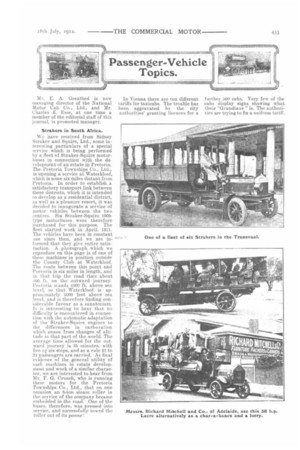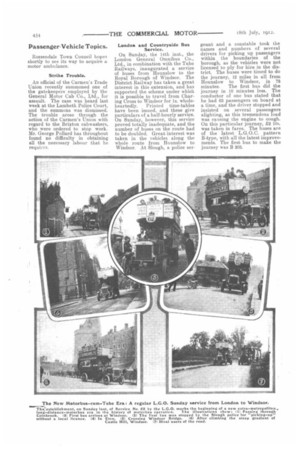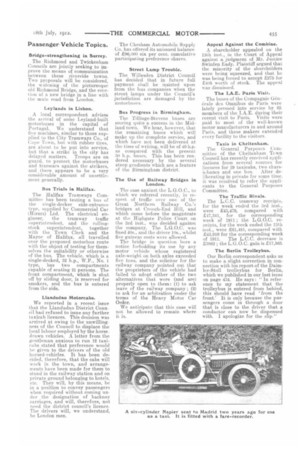Passenger-Vehicle Topics.
Page 15

Page 16

Page 17

If you've noticed an error in this article please click here to report it so we can fix it.
Mr. E. A. Greathed is now rnanagmg director of the National Motor Cab Co., Ltd., and Mr. Charles E. Esse, at one time a member of the editorial staff of this journal, is promoted manager.
Strakers in South Africa.
We have received from Sidney Straker and Squire, Ltd., some interesting particulars of a special service which is being performed by a fleet of Straker-Squire motorbuses in connection with the development of an estate in Pretoria. The Pretoria Townships Co., Ltd., is opening a service at Waterkloof, which is some six miles distant from Pretoria. In order to establish a satisfactory transport link between these districts, which it is intended to develop as a. residential district, as well as a pleasure resort, it was decided to inaugurate a service of motor vehicles between the two centres. Six Straker-Squire 1909type motorbuses were therefore purchased for this purpose. The fleet started work in April, 1911. The vehicles have been in constant use since then, and we are informed that they give entire satisfaction. A photograph which we reproduce on this page is of one of these machines in position outside the County Club at Waterkloof. The route between this point and Pretoria is six miles in length, and in that trip the road rises about 400 ft. on the outward journey. Pretoria stands 4500 ft. above sea level, so that Waterkloof is approximately 5000 feet above sea level, and is therefore finding considerable favour as a sanatorium. IL is interesting to hear that no difficulty is encountered in connection with the automatic adaptation of the Straker-Squire engines to the differences in carburation which ensue from changes of altitude in that part of the world. The average time allowed for the outward journey is 25 minutes, with five or six stops, and as a rule 21 to 2-4 passengers are carried. As final evidence of the general utility of such machines in estate development and work of a similar character, we are interested to hear from Mr. F. G. Crouch, who is running these motors for the Pretoria Townships Co., Ltd., that on one occasion an 8-ton steam roller in the service of the company became embedded in the road. One of the buses, therefore, was pressed into service, and successfully towed the roller out of its panne!
In Vienna there are ten different tariffs for taxicabs. The trouble has been aggravated by the city authorities' granting licences for a
further 500 cabs. -Very few of the cabs display signs showing what their "Grundtaxe " is. The authorities are trying to fix a. uniform tariff.
Passenger-Vehicle Topics.
Rossendale Town Council hopes shortly to see its way to acquire a motor ambulance.
Strike Trouble.
An official of the Carmen's Trade Union recently summoned one of the gatekeepers employed by the General Motor Cab Co., Ltd., for assault. The case was heard last week at the Lambeth Police Court, and the summons was dismissed. The trouble arose through the action of the Carmen's Union with regard to the Brixton cabwashers, who were ordered to stop work. Mr. George Pollard has throughout found no difficulty in obtaining all the necessary labour that he requires. London and Countryside Bus Service.
On Sunday, the 14th inst., the London General Omnibus Co., Ltd., in combination with the Tube Railways, inaugurated a service of buses from Hounslow to the Royal Borough of Windsor. The District Railway has taken a great interest in this extension, and has supported the scheme under which it is possible to travel from Charing Cross to Windsor for is. wholeheartedly. Printed time-tables have been issued, and these give particulars of a half-hourly service. On Sunday, however, this service proved totally inadequate, and the number of buses on the route had to be doubled. Great interest was taken in the vehicles along the whole route from Hounslow to Windsor. At Slough, a police ser
geant and a constable took the names and numbers of several drivers for picking up passengers within the boundaries of the borough, as the vehicles were not licensed to ply for hire in the district. The buses were timed to do the journey, 12 miles in all from Hounslow to Windsor, in 78 minutes. The first bus did the journey in 10 minutes less. The conductor of one bus stated that he had 63 passengers on board at a time, and the driver stopped and insisted on several passengers alighting, as this tremendous load was causing the engine to cough. On this particular journey, £2 los. was taken in fares. The buses are of the latest L.G.O.C. pattern B-type, with all the latest improvements. The first bus to make the journey was B 203.
Passenger-Vehicle Topics.
Bridge-strengthening in Surrey.
The Richmond and Twickenham Councils are jointly seeking to improve the means of communication between these riverside towns. Two proposals will he considered, the widening of the picturesque old Richmond Bridge, and the erection of a new bridge in. a line with the main road from London.
Leylands in Lisbon.
A local correspondent advises the arrival of some Leyland-built motorbuses in the capital of Portugal. We understand that five machines, similar to those supplied to the City Tramways Co., of (Julie Town, but with rubber tires, are about to be put into service, but that a strike in the city has delayed matters. Troops are on guard, to protect the motorbuses and tramcars against the strikers, and there appears to be a very considerable amount of unsettlement generally.
Bus Trials in Halifax.
The Halifax Tramways Committee has been testing a bus of the single-decker side-entrance type, supplied by Commercial Car (Hirers) Ltd. The electrical engineer, the tramway traffic superintendent, and the rollingstock superintendent, together with the Town Clerk and the Mayor of Halifax, all travelled over the proposed motorbus route with the object of testing for themselves the suitability or otherwise of the bus. The vehicle, which is a single-decked, 32 h.p., W.P., No. 1 type, has two compartments capable of seating 21 persons. The front compartment, which is shut off by sliding door, is reserved for smokers, and the bus is entered from the side.
Llandudno Motorcabs.
We reported in a recent issue that the Llandudno District. Coun
cil had refused to issue any further taxicab licences. This decision was arrived at owing to the unwillingness of the Council to displace the local labour employed by the horse_ drawn vehicles. A letter from the gentleman anxious to run 12 taxicabs stated that preference would be given to the drivers of the old horsed-vehicles. It has been decided, therefore, that the cabs will work in the town, and arrangements have been made for them to stand in the railway station and on private ground belonging to hotels, etc. They will, by this means, be in a position to convey passengers when required without coming under the designation of hackney carriages, and will, therefore, not need the district council's licence. The drivers will, we understand, be London men.
The Chesham Automobile Supply Co. has offered its unissued balance of R96,000 six per cent, cumulative participating preference shares.
Street Lamp Trouble.
The Willesden District Council has decided that in future full payment shall be insisted upon from the bus companies when the street lamps under the Council's jurisdiction are damaged by the motorbuses.
Bus Progress in Birmingham.
The 'fillings-Stevens buses are scoring quite a success in the Midland town. We hear, however, that the remaining buses which will make up the complete service, and which have not been delivered at the time of writing, will be of 40 h.p. as compared with the present 30 h.p. buses, This has been rendered necessary by the several steep gradients which are a feature of the Birmingham district.
The Use of Railway Bridges in London.
The case against the L.G.O.C., to which we referred recently, in respect of traffic over one of the Great Northern Railway Co.'s bridges at Crouch-End hill, and which came before the magistrate at the Highgate Police Court on the 3rd inst., was decided against. the company. The L.G.O.C. was fined 40s., and the driver 10s., whilst five guineas costa were allowed.
The bridge in question bore a notice forbidding its use by any motor vehicle whose registered axle-weight on both axles exceeded five tons, and the solicitor for the railway company pointed out that the proprietors of the vehicle had failed to adopt either of the two alternatives that were (and are) properly open to them: (1) to ask leave of the railway company ; (2) to ask for an arbitration under the terms of the Heavy Motor Car Order.
We anticipate that this case will not be allowed to remain where it is. Appeal Against the Combine.
A shareholder appealed on the 15th inst., in the Court of Appeal against a judgment of Mr. Justice Swinfen Eady. Plaintiff argued that the minority of the shareholders were being squeezed, and that he was being forced to accept S',276 for £405 worth of stock. The appeal was dismissed.
The I.A.E. Paris Visit.
The buses of the Compagnie Generale des Omnibus de Paris were lately pressed into service by 65 members of the LA,E. during their recent visit to Paris. -Visits were paid to most of the well-known motor manufacturers in and around Paris, and these makers extended every facility to the visitors.
Taxis in Cheltenham.
The General Purposes Cominitte,e of the Cheltenham Town Council has recently received applications from several sources for licences for 29 taxicabs, two chars
h-hancs and one bus. After deliberating in private for some time, it was resolved to refer the applicants to the General Purposes Committee.
The Traffic Rivals, The L.C.C. tramway receipts, for the week ended the 3rd inst., were £43,479, compared with £47,341, for the corresponding week of 1911; the L.G.O.C. receipts, for the week ended the lath inst., were £61,481, compared with £43,916 for the corresponding week of 1911. The L.C.C. decrease is £3862; the L.G.O.C. gain is £17,565.
The Berlin TroIleybus.
Our Berlin correspondent asks us to make a slight correction in connection with his report of the Daimler-Stoll trolleybus for Berlin, which we published in our last issue on page 434. Ile says : "In reference to my statement that the trolleybus is entered irons behind, this should have read 'from the front.' It is only because the passengers come in through a door that is close to the driver that a conductor can now he dispensed with. I apologize for the slip."






















